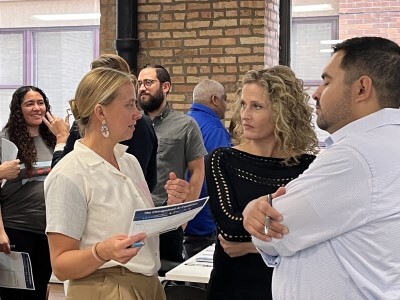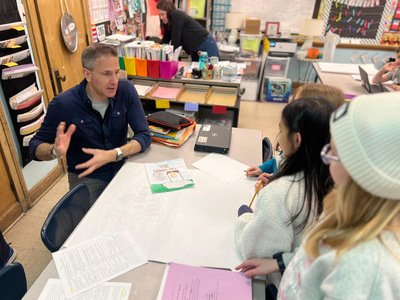Technology Tools
Lessons Learned: Engaging Students Deeply as Project Partners
Topics

Educators often take advantage of educational technologies as they make the shifts in instruction, teacher roles, and learning experiences that next gen learning requires. Technology should not lead the design of learning, but when educators use it to personalize and enrich learning, it has the potential to accelerate mastery of critical content and skills by all students.
Undergraduate students serving as collaborators are vital project partners for Wake Forest’s BioBook, a low cost open-source integrated teaching and learning environment.
Educational innovators must answer many questions for their target students: what do they already know? What tools do they need to be successful learners? What strategies will best support their accomplishing their goals? Often we seek answers in published research and ignore the insights students themselves can provide, even though (as anyone who has seen peer-led or near-peer instruction can attest) students have valuable insight into how to help each other learn.
Undergraduate collaborators have been vital project partners for BioBook since it launched in 2007, and make up most of our workforce. Briefly, BioBook is a low cost open-source integrated teaching and learning environment (www.adapaproject.org) that replaces traditional print textbooks for general biology for students not planning to major in the discipline. BioBook uses proven best practices to support the ways students learn naturally. Instructors can adapt, tailor, and expand BioBook to fit their unique course goals and student population.
Our approach originated in a one-semester seminar where 16 undergraduates (only one a biology major) developed a prototype chapter (Mitosis, Meiosis, and Mendel). We set one ground rule: find out what students want and need most, write a chapter containing those elements, and eliminate the rest. Their end product was very different from commercial texts, yet incorporated multiple best learning principles. Students in a non-majors course compared the seminar team’s chapter to their textbook and rated it higher for overall readability and learning support.
Our strategy to get (and keep) students engaged in the development of BioBook is to get them working on authentic activities as early as possible. Most students start as text reviewers. Over a week they read three to five finalized pages and then provide ”near-peer” review for three to five draft pages. Their suggestions are integrated into pages that are published shortly afterwards. This exercise lets us evaluate their commitment, skills, and strengths quickly as they learn our workflow and format. Subsequently, students work on project “granules” of different sizes and complexity that can be integrated into the larger framework. Some continue reviewing content. Others aggregate content and create new draft pages, add wiki coding to plain text, create new illustrations, photograph biological specimens, create videos, build supplemental exercises, and write assessment questions. BioBook is a live resource, so students get immediate public acknowledgement of their effort; they can point to an element and say, “I made that.”
We support student participation several ways.
- Federal work study. Working with our local coordinator we target potential biology majors, and offer them an opportunity to work on a project more directly related to their academic interests than clerical work or lab support.
- Academic credit. Wake Forest University’s biology department awards up to 4 credit hours for research, and requires at least 1 semester of research for the BS degree.
- Institutional summer research internships. Our students have applied for several internships successfully.
- NSF “broader impacts” funds. Looking ahead, recent changes in “Broader Impacts” requirements for NSF proposals will likely create new opportunities for supporting students.
Level of effort and intellectual growth varies among students. A few participate mainly to build their resume, but the majority become personally invested in our success. Two students have been partners for three years, and one hopes to continue as project staff after graduation. Personally, it has been extremely gratifying to watch their perspective grow from seeking approval (“So I hope you won’t be mad, but can I…”) to confident self-direction (“I changed what you had, because…”).
What lessons have we learned?
- Near-peer students can identify barriers to learning that instructors and book authors do not see.
- Students will invest deeply in an authentic project that has tangible outcomes.
- If encouraged, students infuse a project with fresh ideas and will find many resources that faculty and staff are unaware of.
- Project managers must give students opportunities to speak openly and freely and encourage them to be brutally honest.
- Faculty and project staff must LISTEN actively without judgment or disagreement, especially if students think we might not like what we hear.
The final lesson may be the most important: students’ perspectives reflect what they EXPERIENCE, not what is planned. Innovations can be delivered in ways that negate their impact, and what scholarly publications say is a best practice may not translate to a particular community. Robust curriculum designs use assessment to obtain feedback on learning outcomes and identify areas for improvement. Deeply involved student partners can provide rich feedback much earlier in the development process. All we need do is ask, then listen.
Interested in BioBook? To learn more, take a look at this video:
And Biobook is available for adoption: to explore the possibility, contact us at info@adapaproject.org.
Want to look through BioBook, browse one of our other projects, or try out our ALT Framework for yourself? Go to www.adapaproject.org.




